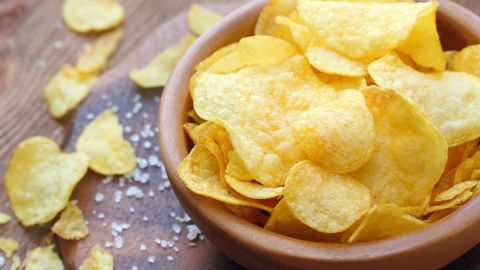CNN —
On the monumental day that Nancy Pelosi announced she’d be relinquishing her role as leader of the House Democrats, she didn’t mark the occasion with a gourmet meal. Instead, the 82-year-old reportedly indulged in the same lunch she eats every day: a hotdog with mustard and relish.

This isn’t the first time Pelosi’s meal choice has raised eyebrows. Last year, she admitted on an episode of the “River Cafe Table 4” podcast that she often eats chocolate ice cream for breakfast. “It’s right there, it has a long shelf life … It’s a great way to start the day,” she remarked.
But as endearing as it is to imagine a politician scarfing down a frank with all the fixings or a bowl of chocolate ice cream, new research is exposing the health impacts of diets like Pelosi’s, high in ultraprocessed foods.
Pelosi isn’t an outlier. In the US, a whopping 58% of adults’ daily calories, and 67% of kids’ daily calories, come from ultraprocessed foods, according to cancer epidemiologist Fang Fang Zhang.
But when we reach for that bag of Doritos in the larder, do we realize we are indulging in an ultraprocessed snack? What about when we toss plant-based meat alternatives into a stir fry?
Do we truly understand what makes a food “ultraprocessed”?
“A food is ultraprocessed if you can’t make it in your home kitchen,” says Marion Nestle, author of over a dozen books on nutrition and food politics. At 86, Nestle, who retired in 2017, holds the title of Paulette Goddard professor of nutrition, food studies and public health at New York University.
“It is a specific category of junk food that’s industrially produced. It doesn’t look anything like the foods from which it is derived, and usually has a lot of chemical additives of one kind or another,” she explains. “These foods are industrially formulated to be irresistibly delicious so you can’t stop eating them.”
Often chock full of added sugars, ultraprocessed foods are addictive. Some experts have likened these foods to cigarettes in the way their processed chemicals can give the consumer a jolt of pleasure and leave them wanting more.
This is surely no accident on the part of the manufacturers; our insatiable love of these foods keeps us buying them again and again. Indeed, the US has seen an increase in consumption of ultraprocessed foods over the past two decades, across almost all segments of the population, according to a 2021 study by New York University’s School of Global Public Health.
But with research illuminating the health consequences of these foods, consumers may have to start asking themselves whether eating them is worth the possible downsides.

A study published in the journal eClinicalMedicine last week found that eating ultraprocessed foods increases one’s risk of getting and dying from a number of cancers. Researchers evaluated the diets of 197,426 people in the UK from 2006 to 2010 and found that the amount of ultraprocessed foods eaten ranged from 9.1% to 41.4%. With each 10% increase in ultraprocessed food consumption, there was a 2% increase in developing any cancer – and a startling 19% increase in risk of ovarian cancer, according to a statement by Imperial College London, one of the institutions involved in the study.
What’s more, for each 10% increase in ultraprocessed food consumption, the risk of death from any type of cancer rose by 6% – and the risk of dying from ovarian cancer grew by 30%, the statement noted.
The study’s results are unsettling, but they’re not surprising to experts. This is merely the latest in a body of research that has found ultraprocessed foods to have a negative impact on human health.
Last year, a study of people in the US published in the British medical journal BMJ found that consuming large amounts of ultraprocessed foods significantly increases the risk of colorectal cancer in men – and can lead to heart disease and even early death in men and women.
Another study published last year in JAMA Neurology found that those who consumed at least 20% of their daily calories from ultraprocessed foods may be at an elevated risk for cognitive decline.
Pelosi offers some proof that good genetics can allow for a long and full life, even in the face of an unhealthy diet. But knowing the potential health risks, why do we continue to rely on ultraprocessed foods to make up such a large portion of what we eat?
An overwhelming contributing factor is accessibility. Ultraprocessed foods tend to be cheaper and last longer than less-processed alternatives. This makes them the most practical food options for people who reside in food deserts, low-income areas where many residents do not have easy access to a large grocery store. The US Department of Agriculture estimates that 18.8 million people, or 6.1% of the population, reside in these underserved areas, based on data from 2015-2019.
Efforts to make healthy foods more accessible nationwide have been a centerpiece of policy initiatives aimed at bolstering the collective health of the nation. Just last month, the US Department of Agriculture announced it would invest $25 million in providing coupons, discounts and other incentives that encourage Supplemental Nutrition Assistance Program (SNAP) recipients to purchase healthy foods such as fruits and vegetables. And at the state level, programs are in place and being adopted to help residents afford and access nutritious foods.
The question is whether federal and state-level policies will go far enough to bring healthy options within reach for those who currently lack access to them. “To put a burden on individuals to fight an entire food system on their own is really asking a lot of individuals,” says Nestle, who notes that a change in the US food environment is essential.
For those who do have access to a variety of food options, the challenge remains to overcome the urge to choose ultraprocessed foods. We need only look at another recent American leader to understand how difficult this can be. Former President Donald Trump reportedly gulped down 12 Diet Cokes a day. Once you start drinking them, it’s hard to stop. And for manufacturers, that’s exactly the point.

This interview has been edited for length and clarity:
CNN: Why is it important that we understand which foods are ultraprocessed? What is the benefit of sticking that label on foods?
Nestle: The concept of ultraprocessed foods is relatively new – it was developed by public health researchers in Brazil. Now that we can define the category of ultraprocessed foods, we can do research to examine people who eat these kinds of foods and people who don’t, and look at the difference in their health. By doing so, it has become clear that people are healthier if they don’t eat a lot of these foods.
In addition to the latest study showing an association between ultraprocessed foods and cancer rates, there’s a phenomenal number of others that associate consumption of these foods with poor health outcome, type 2 diabetes, heart disease, risk of contracting Covid-19 and increased mortality rates.
There has also been a causation study, which showed that ultraprocessed food was the cause of a negative health outcome. It was done in a metabolic ward where people were given two different kinds of diets and were allowed to eat as much as they wanted. The diets were matched in every possible way, except for the degree of processing of the foods.
What the researchers found was that the people on the ultraprocessed food diet ate 500 calories more a day. That is an enormous difference.
CNN: Why was that? Were the ultraprocessed foods more calorie dense, or did the subjects on that diet consume larger quantities of food?
Nestle: One of the hypotheses is that, because ultraprocessed foods are so palatable, the subjects on that diet ate faster, which led to them to eat more calories.
CNN: Some research has found that ultraprocessed foods have addictive qualities. Do you see that as being part of the issue?
Nestle: Yes. Michael Moss’ books, including “Salt Sugar Fat,” talk about the addictive qualities of ultraprocessed foods. There has been a deliberate attempt to make foods so deliciously irresistible, that you eat more and more and you can’t stop. If you have a bag of potato chips in front of you, you can’t stop reaching into the bag. There’s always room for one more. But, as someone once pointed out to me, people don’t do that with salads.
CNN: Ultraprocessed foods are often cheaper and more accessible than fresh foods. Why do you think this persists despite what we know about the negative health ramifications of consuming them in large quantities?
Nestle: Well, it’s policy. We have a food system that supports the production of cheap ingredients. Producers can buy those ingredients, put the ultraprocessed product on the shelf, and let it sit there. When something is perishable there are extra costs associated with it.
CNN: What would it take for that to change – for there to be a shift toward more access to healthier foods? And for people to be motivated to make those healthier choices?
Nestle: Some change is already happening. The government listed the effects of ultraprocessed foods as an issue that will be considered when it reviews the Dietary Guidelines for Americans, which will be published in 2025. That’s a big change. That’s the first time this has happened.
So, we’re seeing what could be a start. But we need a change in the eating environment in America so that healthy choices become easier to access, less expensive and the preferred choice for shoppers.
There are also things we can do at the individual level. The first thing we have to do is to teach people about what the food system is like, and how there’s profitability in selling ultraprocessed foods. Food companies are not social service agencies, they’re not public health agencies, they’re businesses. They make a lot of money for stockholders by selling their ultraprocessed foods, so companies don’t want to change.
CNN: What impact do you think this attention to ultraprocessed foods will have on consumers’ grocery habits? We’ve seen trends toward organic and non-GMO products. Do you think there will be similar trends toward non-ultraprocessed foods?
Nestle: I’m willing to bet that companies are going to start advertising that their products are not ultraprocessed. This issue comes up with plant-based meat alternatives. One of the criticisms of the plant-based meat alternatives is that they’re ultraprocessed; you can’t make them in your own kitchen. But the plant-based companies are fighting back against that.
CNN: The body of research on the health implications of eating ultraprocessed foods is set against the backdrop of concerning health trends, like the rising obesity rates among both kids and adults. Do you see a move away from ultraprocessed foods as something that could help curb these negative health trends?
Nestle: Studies show that ultraprocessed foods encourage people to eat more calories, and the subjects gain weight as a result. So, if you want to do something about obesity, and you want to lose weight, one way to do that would be to eat fewer ultraprocessed foods.
CNN: What’s the takeaway message for people who are looking at these emerging studies of ultraprocessed foods as a wakeup call to change their diets?
Nestle: The take home lesson from all this research is to understand what ultraprocessed food is and eat less of it. If you’re somebody who can’t resist this stuff if you have it in the house, don’t buy it.
You should also follow basic dietary advice, which is so simple that Michael Pollan sums it up in seven words: “Eat food. Not too much. Mostly plants.”
If you know how to cook, you can eat rice and beans and vegetables, and small amounts of meat, and it doesn’t cost very much. But that requires cooking facilities, time to do the cooking, and a cultural environment in which that kind of cooking is desirable. And that’s not how our country works.
But the word is out that avoiding ultraprocessed foods is a good thing to do – not avoiding them completely, because we love these foods, but just eat less.


